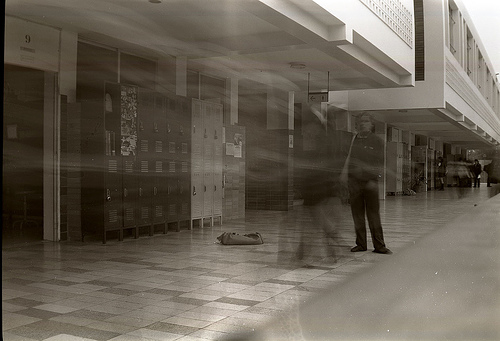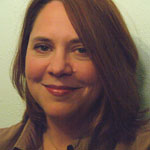Theme Essay by Emily Cicchini
A Teacher Evaluates Her Own Teaching
Sometimes, I think I was a good teacher. A very few of my former students and colleagues have gone on to make Hollywood films and write Broadway dramas. One made quite a mark in the Internet gaming industry. Still others have kept in touch, expressing their gratitude in unexpected ways.
But I wonder if it’s right to take pride in their accomplishments. They could have done these things without my influence. Maybe the ones I think I failed were those I helped the most.
Today, there’s endless talk of evaluating teachers. Plenty of administrators want to “grade” teachers based on student evaluations—and for six semesters in a large public university and also as a part-time instructor at a community college, I received the requisite course evaluations in the creative writing and screenwriting classes I taught.
These were always based on a five-point scale of not-too-deep questions about course organization. They would be administered—conveniently—before final grades were posted.
Such surveys really don’t reflect the impact a teacher makes in a student’s life. That may be frustrating to those who insist on “data” for student “customers,” but it’s hard, if not impossible, to know the long-term outcome of a single teacher’s efforts. It must be measured over time.
Beyond quickie course evaluations, you can look at a course syllabus, which reveals both stated and implied methodologies. Like most teachers in the arts, my lesson plans were full of a trusty bag of pedagogical tricks that I tweaked over a period of years. These tools were pilfered with credit and love from my own creative writing mentor-teachers.
I often began with group exercises: passing the page, or “writing on our feet,” to break the ice and get novice writers out of their heads and into their bodies and the world around them. I’d then move on to sequences of exercises designed to illustrate the finer points of character or plot or dialogue or setting development. Sometimes I’d throw in drawings or music or other aids to help spark creative work.
But I used these methods because they’d worked for me in the past, not because I’d thought out the methodology behind them. Other than trying to impart the generally accepted model of traditional dramatic form that goes back to Aristotle, my basic goal was to help students find their voices: to be true to what they wanted to write.
I also worked in less-than-ideal conditions in community-based settings, where improvisation and flexibility were essential. I taught writers so unsure of their voices that all I could do was get them to speak their inner songs: city kids who barely knew how to use a pencil on paper but who could effortlessly create beautiful, rhythmic images orally. I’d listen and transcribe their words, like code, so they could see their thoughts translated into words on a page.
I worked with bilingual Spanish kids who were better at drawing their stories than writing them in words. I’d let them sketch and draw during our time together, and the single, exact choice of a title would bind their ample imaginations to language.
I once worked with a group of elderly dementia patients who could tell amazing stories of the past when they put on funny hats out of a box—but who couldn’t remember a word as soon as the hat was gone. We took snapshots and wrote key words to record the work.
My main objective for such challenging students was that they complete work that could be shared with family and friends. Sometimes I fear I intervened too much, coaching and polishing so their efforts seemed better than they were. The quality of these students’ products didn’t always meet high artistic standards. Still, I was often as proud of my nontraditional students as I was of my advanced grads.
Most of the time, I did pretty well. A few times, I did not. I gushed about someone’s work too obviously in front of others, who no doubt felt inferior to the object of my fickle attention. I’d get angry and frustrated when students repeatedly missed deadlines. There’s little to do in a creative writing workshop if students bring nothing to discuss.
While I no longer teach, I still try to be helpful and inspiring to other writers, in the way that one of my most prominent teachers, James A. Michener, inspired me.
In the early 1990s, I was an MFA student at the University of Texas at Austin. Michener was already in his eighties then (he died in 1997). In his classes, he wore the same modest blue windbreaker every day.
“It’s really about learning the world and knowing people,” he told us in one seminar. “Writing is the most noble of professions.”
That nobility of writing, in Michener’s terms—the fact that writers, students, and teachers fail and succeed—continues to motivate me nearly 20 years later. In an ideal world, I’d love to track down all my former students and ask them these open-ended questions:
- Did I help you understand why you want to write?
- Did I help you feel more confident in your ability to use words?
- Did I help you decide to go in some particular direction with your writing? Was it the right way for you, when you look back on it?
- Are you still writing? Do you still like it? Why or why not?
- Have your goals as a writer become clearer? Have they changed from when you started, or stayed the same? Have you reached any of them in a way that satisfies you?
They’re the questions I still ask myself.
Art Information
- “Workshop Hands” © George Jisho Robertson; Creative Commons license
- “Untitled” (women with hat and pearls) © Lightfoot; stock photo
- “Hallway” © Nick Wiesner; Creative Commons license
Emily Cicchini is a published and award-winning dramatist and resident playwright of The Pollyanna Theatre Company. She was an early James A. Michener Fellow and holds an MFA from the University of Texas at Austin.
For more information, visit Emily Cicchini’s website.




